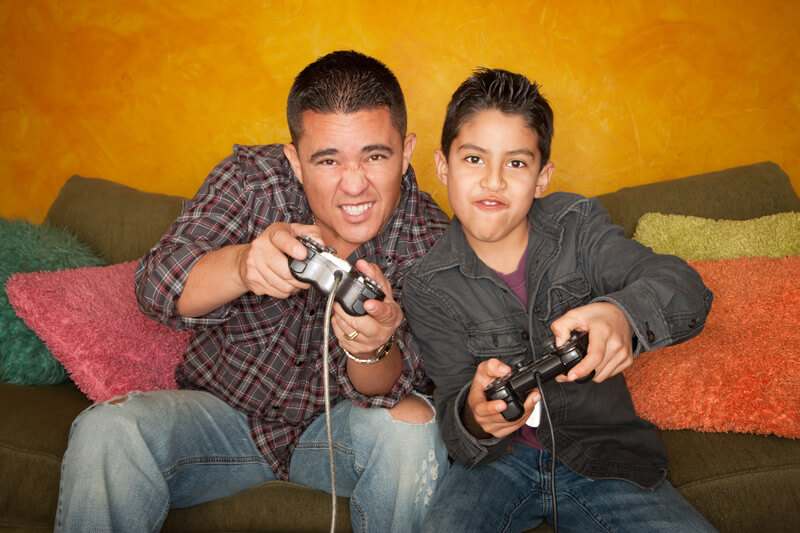My doctor asked me if I drink alcohol. I told her I usually have a glass of red wine with dinner and another glass later. She said, “That’s probably OK. The research says red wine has a number of health benefits. Men can drink up to two glasses of red wine each day, but more is definitely bad for you. Plus the empty calories, and you’re trying to lose weight. You can get all the benefits from just one glass.”
Let’s see…a glass of wine equates to 5 fluid ounces, so two glasses would be 10 ounces. That’s less than half a bottle, which has 25 ounces. But if I usually drank the whole bottle, I’d be gaining weight and probably damaging my health. Plus, I’d probably be addicted to alcohol.
It’s interesting how too much of a good thing can be really bad for you.
Moderation!
This reminds me of video games, which are as big a part of our culture as red wine. In moderation, it can have several benefits for a young person:
- The games are fun, engaging, and exciting.
- Players strive to prevail against challenges and achieve goals.
- They can be a hero in the virtual world of the game.
- The sense of accomplishment can boost self-esteem.
- They can play the games with their friends.
- Some of the games actually promote critical thinking.
But like red wine, too much of a good thing can have damaging consequences:
- Video games are a HUGE industry, much bigger than movies. For business reasons, the games are designed to be addictive. Success in a game triggers dopamine, the reward neurotransmitter, making the child want to spend more time gaming.
- Like alcohol, it’s a slippery slope. A fun half-hour can easily turn into an hour. An hour can lead to several hours, even all night or all weekend.
- Virtual reality affects the brain the same as ordinary reality. Exciting challenges stimulate the production of adrenaline and cortisol. These natural reactions subside if the event is momentary. But cortisol build-up in brain cells caused by prolonged stress can kill brain cells in the hippocampus (memory and learning) and prefrontal cortex (the smart part of the brain). Normal development of the prefrontal cortex could be disrupted.
- After hours of simulated combat, because of residual cortisol in the brain, the keyed-up combative mindset continues after putting the game away.
- Opportunity costs are huge. Time spent in front of a screen is time not spent relating to friends and family, doing homework, helping with chores, learning life skills, getting physical exercise, or enjoying the natural world. Even sleep and hygiene can be neglected.
- Once addicted, the child will find it almost impossible to give up gaming for healthy, productive activities. As problems build in normal life, self-esteem is degraded.
- The most exciting and addictive games are the shooter games. Minute by minute, hour by hour, a child’s brain is exposed to countless emotionally-charged images of killing people–great for the video game industry, awful for the young gamer.
Do you think your child has enough maturity and self-discipline to drink alcohol in moderation?
Of course not.
Do you think your child has enough maturity and self-discipline to play video games in moderation?
Hmmm…
Moderation is half an hour a day, or maybe an hour if your child is a top student. So no, they can’t handle it without your help – rules, boundaries, monitoring, and consistently enforced consequences – to prevent excessive exposure to gaming screens.
Fun for the whole family or dangerous addiction?
It may come to you as a surprise that something so much fun and promoted so thoroughly in our culture can be so toxic. Back in the day, cigarettes were promoted to young people. Everyone thought smoking was cool until research revealed that it caused lung cancer. The tobacco industry didn’t care; they hired their own scientists to come up with their own research. Without federal regulations, cigarettes would still be promoted to young people.
Now, it’s video games. Playing the right games (educational, strategy and sports games), while avoiding the shooter games, and playing in moderation can be beneficial. But like the tobacco industry, the gaming industry knows its products are addictive and unhealthy, but they don’t care.
You may be wondering which games are first-person shooter (FPS) games. With new games being introduced all the time, the answer changes. Google “top shooter games” and click on some of the links.
Yeah, it’s scary. Cancer is scary. Violence is scary. Derailed brain development is scary. Addiction is scary. Go to YouTube and search on “video game addiction.”
This scary aspect of video games is only recently being acknowledged. If you haven’t already done so, I encourage you to read the World Health Organization’s report on “gaming disorder.”
More truth-telling about excessive screen time.
 The background of this issue is discussed at length in Chapter 6 of my book, How Your Teen Can Grow a Smarter Brain.
The background of this issue is discussed at length in Chapter 6 of my book, How Your Teen Can Grow a Smarter Brain.
You can grow the bond with your child through better listening. Download the FREE ebook, Listening to Understand.

